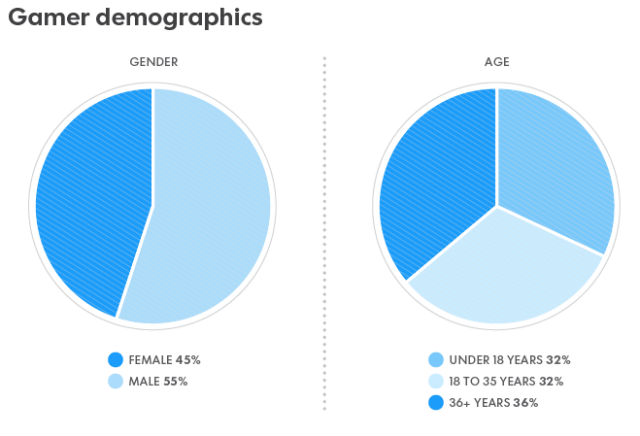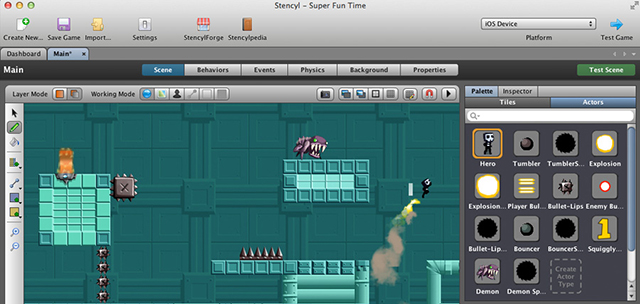

Playing video games can relieve your stress, reduce your depression, and make you feel better.
That may sound like a big claim to make, but at this point there’s plenty of evidence available to support it. Enough evidence in fact, that if video games aren’t a regular part of your life right now, adding a bit of game-playing time to your schedule could actually improve your mental health in many surprising ways.
This topic is not without its controversy, and there are plenty of studies and research on both sides to build a case on either, but lately the research in favor of video games is so compelling that it’s almost irresponsible to not acknowledge the many benefits that video games offer.
When you think of gaming, you may picture a bunch of teen boys sitting in front of a big-screen TV like zombies, incessantly jamming buttons on their controllers, while aggressively playing violent video games.

This stereotype has been blown away by current research into what demographics play video games today. 2013 numbers from the Entertainment Software Association revealed that women have actually caught up, and the age groups that make up game players are well represented from 0 through 100 years old.

More recent numbers put men and women pretty much on equal footing as game players. This reality means that people from every walk of life and every age group turn to video games for their entertainment.
There is a reason so many people turn to gaming, and if recent research is any indication, it’s because video games provide a tremendous vehicle for stress relief in anyone’s life (plus, they’re fun).
A 2010 study at Texas A&M conducted by Associate Professor Dr. Christopher J. Ferguson showed that both men and women who play violent video games long-term seem to be able to adopt mental skills to handle stress, become less depressed and get less hostile during stressful tasks.

Ferguson’s sample size was 103 students, and he explained the study as follows:
“In this study, 103 young adults were given a frustration task and then randomized to play no game, a non-violent game, a violent game with good versus evil theme, or a violent game in which they played ‘the bad guy.’ The results suggest that violent games reduce depression and hostile feelings in players through mood management.”
In fact, Ferguson suggested that violent video games could potentially be used as a form of therapy to help people find a way to “work through their frustrations” in real life.
For avid video gamers reading this, the results probably come as no surprise, considering that if you ask anyone you know who plays games why they play, a common answer is, “to relax” or “de-stress”.
How #Superheroes De-stress.. #Batman #Superman #gaming #SupermanVsBatman #gamer #BatmanvsSuperman #yoga pic.twitter.com/fmYHZqE7Cg
— Superhero Of Steel (@SuperheroSteel) February 26, 2014
In fact when researchers at Massachusetts General Hospital polled children there about their video game playing habits, they discovered that a majority of kids choose to play video games as a way to manage difficult feelings like anger and stress.
In a 2014 study at University College in London, researchers surveyed 491 subjects and found a correlation between the total number of hours spent playing games (primarily first person shooters and action games) per week, and overall recovery from work-related stress that day.
Researchers Emily Collins and Anna L. Cox confirmed that there’s a clear correlation between playing games and handling stress better, but also noted that there is not a proven causal relationship, because as they explain:
“If an individual plays digital games, this may be due to the ability and inclination to take time to themselves and to pursue hobbies, and it may be this that reduces WHI and the need for recovery rather than the activity itself.”
So, whatever the reason – if you make the conscious choice to play video games after work, you will experience faster recovery from the stress you experienced, and you’ll be able to handle that stress all that much better the next day.
It isn’t just children or young adults either. Researchers at the National Institute on Aging were so impressed by studies showing the positive effects of video games on cognitive functioning, that they launched a $1.2 million National Science Foundation (NSF) project to use a Nintendo Wii to try and help improve the daily cognitive functioning of senior citizens.
Okay….so maybe not Mortal Kombat….but you get the point.
Clearly, video games do have a direct, positive effect on the human brain. However, contrary to popular belief, the effects of video games are not negative, but positive.
In one 2009 study published in the Journal of CyberTherapy & Rehabilitation, researchers tested the effects of casual video games (CVGs) on gamers. The effects tested in this study included electroencephalography (EEG), and heart rate variability (HRV).
Since both of these physiological responses are used to indicate when someone is stressed, common sense would tell you that during video games that require a lot of attention (and often stressful, timed tasks), a person would end up more stressed than ever before!
The opposite was actually true. Researchers found that:
“Remarkably all three games had different yet complimentary mood lifting effects. BJW 2 decreased left alpha brain waves associated with a decrease in withdrawal and depressive type behaviors, and PGL increased right alpha brain wave activity associated with excitement or euphoric behaviors.”
The final conclusion of the researchers was even more surprising. Not only did they suggest that gaming can help to reduce your stress, but they suggested using gaming as an actual form of therapy for people who suffer from various mental health issues.
“These findings have broad implications which include the potential development of prescriptive interventions using casual video games to prevent and treat stress related medical disorders.”
This statement is plenty of vindication to convince anyone that taking a bit of time out of your day to play video games is very good for your mental and physical health.
These findings supported an earlier study from McGill University in 2007, when researchers found that playing what they called “social-intelligence games”, reduced the stress hormone cortisol by an impressive 17 percent. It seems fairly obvious that if you play video games, you will not be as stressed out as you are right now.
This research and the latest findings in this area of study have been enough to convince me to alter my daily schedule so that – in addition to going to the gym and working out at least 60 minutes a day – I am also scheduling in time to play some form of video games.
It seems like really anything will do – from action-packed first person shooters, to mind-challenging casual games online or on your mobile.
Do you play games to reduce your stress, if so, which ones reduce stress for you the most? If you don’t play games, are you considering doing so now? Share your thoughts in the comments section below and let’s discuss!
Phoenixns via Shutterstock




 Harvest Moon 3D: Lost Valley - general tips (3DS)
Harvest Moon 3D: Lost Valley - general tips (3DS) Lost Planet 2 Guide
Lost Planet 2 Guide Top 8 Tips and Tricks For MGS V: Metal Gear Online
Top 8 Tips and Tricks For MGS V: Metal Gear Online Divinity: Original Sin Wiki – Everything you need to know about the game .
Divinity: Original Sin Wiki – Everything you need to know about the game . 5 Sites for Anyone Interested in Learning to Make Games
5 Sites for Anyone Interested in Learning to Make Games